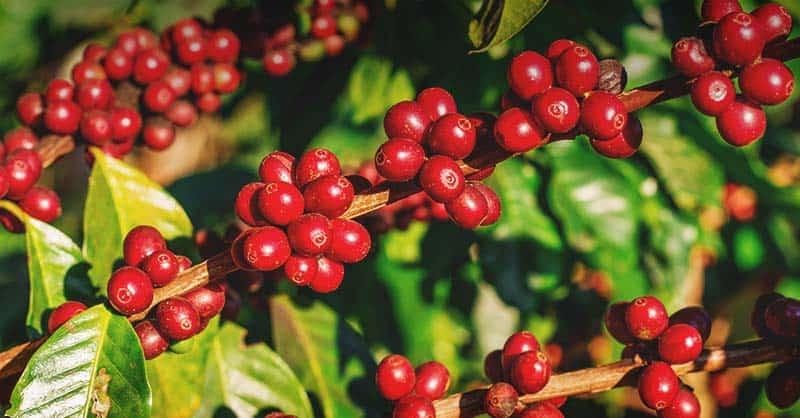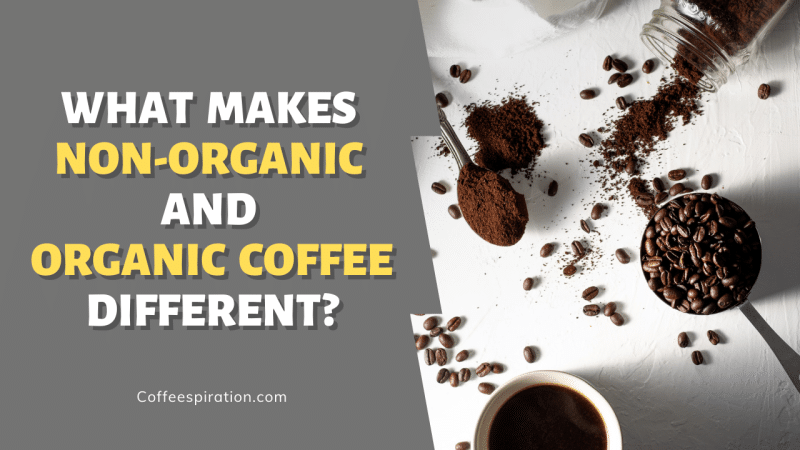Coffee has become a trend for most people in today’s world. Some people fall in love with coffee to increase productivity and wake you up in the morning. Thus, drinking coffee has become a routine, and one cannot live without coffee. With such trends, billions of coffee are produced using chemicals to prevent the coffee beans from pesticide and extend their expiration period. Some people don’t mind drinking non-organic coffee at all. As long as they have their coffee during their day to boost their productivity.
However, some people would love to consume only the organic products because they think that the organic one is healthier. Thus, they tend to have many concerns when it comes to non-organic coffee. Hence, this article will tell you what organic coffee and non-organic coffee is and the main difference between the two.

Therefore, being healthy has become a major concern. However, do you know what kind of coffee that you consume? I mean for what kind of coffee refers to whether the coffee you consume was grown organically or chemically? Now we will see what is the different.
Contents
What Is Organic Coffee?
It is refers to the coffee that is naturally grown without any use of synthetic types of fertilizers. This mainly depends on the land, using natural fertilizers like chicken manure, coffee pulps and other organic manure. There is no involvement of pesticides or herbicides in the growing process at all. Moreover, the land used to grow organic coffee tends to have no toxins because it already detoxifies toxins. Therefore, many specialists recommend the public consume organic coffee rather than non-organic ones since it reduces the risk.

What Is Non-organic Coffee?
Unlike organic coffee, in planting, non-organic coffee tends to involve the use of synthetic fertilizer to improve the fertility of the land and increase the growing speed. Meanwhile, the farmers use chemicals like pesticides and herbicides to monitor and control the infection during growing. The other chemicals like colors, food preservatives, and artificial flavors are used to improve the quality and outlook to attract customers’ attention and interest. Consequently, it leads to the negative impact to one’s health and leads to cancer as well.
The Differences
Planting Process

As mentioned above, the most significant difference between the two types of coffee is the farming process. For organic coffee, the farmers tend to avoid using chemicals as much as possible and use natural fertilizer instead. Therefore, it is very difficult for the farmers to protect the coffee bean from the insect and the weed. Some farmers even use the animals to eat the weed to remove the weed from the soil. At the same time, non-organic coffee tends to have chemical fertilizers to increase productivity. Using chemicals, the farmers don’t have to pay much attention to the insects and pollute the soil.
Side Effects of the coffee
As you may know, we can drink coffee with a limited amount to ensure our safety and health. However, the consumption of non-organic coffee will bring numerous impacts on your health because there are harmful chemicals. Consuming non-organic coffee will cause cancer, your nervous system as well as your reproductive system. While there is no study reported about the risk of consuming organic coffee within the limited amount per day. It may also helps you eliminate wrinkles, enhance your immune system, fight cancer due to the number of antioxidants in organic coffee. Hence, organic ones is safer than non-organic coffee.
Taste
It is believed that organic coffee has a rich and full flavor than non-organic coffee because the coffee bean is planted naturally without any harmful chemicals. However, since there is no specific study published about this issue, some people argue that shade determines the taste of the coffee. It is said that the coffee that is grown in the shade results in a better taste than the coffee that is planted in full sunlight.
Meanwhile, a professional coffee drinker shares a different opinion toward this issue. He stated that although organic coffee has a better taste than chemical one. But there still have another regular brew coffee that has a better taste than organic. And each kind of coffee has its unique taste and whether it tastes good or not. It depends on the individual drinker because people have different preferences.
Impact to the Environment
As mentioned earlier, to grow non-organic coffee beans, it is undeniable that the farmers need harmful chemicals to ensure productivity. However, such action affects people’s health and leads to soil pollution. While organic coffee, it tends to offer a variety of benefits to the environment despite the drawback. Organic coffee itself produces less carbon while improves the quality of the land and soil. Meanwhile, organic coffee also keeps the forest and the existing habitats because to grow the non-organic coffee effectively. It isn’t easy to grow and harvest the coffee bean in the thick forest. Thus, the farmers tend to deforest those thick forests to have a more open field for the coffee bean. Therefore, it leads to deforestation and loss of habitats.
Is organic coffee worth it?
Taking the benefits of organic coffee and the drawback of non-organic coffee, it is worth paying a little more for organic coffee because it has better health benefits than non-organic ones. Moreover, although you spend higher prices on coffee, it will save you a lot on health care services in the long run. In addition to this, if you want to consume organic coffee at a lower price, you can buy the organic coffee subscription. By doing so, you can save 10%-15% of the coffee. And in the long term, you will save around $400 per year, which is quite a lot already. So why not switch from non-organic coffee to organic coffee.
Is there any organic coffee that has lower acidity?
Almost every kind of coffee contains acidity that irritates your esophagus, upsets your stomach and so on. Thus, it is not surprising that you seek coffee with low acidity. The brewing process mainly determines the level of acidity in the coffee. However, some organic coffee brands still offer this kind of coffee, including LifeBoost Organic Coffee, Don Pablo Subtle Earth Organic, Puroast Coffee, and so on.
Conclusion
There are some differences between organic and non-organic coffee, such as the planting process, the taste, effects on health and the effects on the environment. However, despite the higher price of organic coffee, there is no other reason not to choose organic coffee because it brings you numerous benefits, including a healthier lifestyle, better environment and lower acidity. Therefore, it would be great to consume organic coffee. Yet, it does not mean that you should not consume non-organic coffee at all. You still can do so if you don’t mind the side effect of non-organic coffee to your health and the environment. Ultimately, we hope this article can help you differentiate between the two kinds of coffee beans.
Reference
